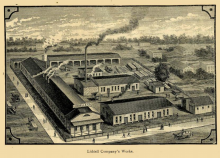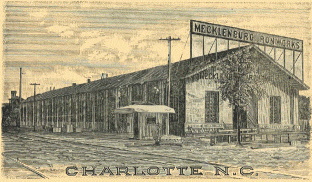You are here
Industries
This information was first published in 1888
THE INDUSTRIES OF CHARLOTTE. (pp.30-34)
CHARLOTTE ranks, industrially, as one of the most important inland cities of the South. As nearly as can be estimated $2,100,000 are now invested in manufacturing enterprises in the city. Among the oldest enterprises are the extensive iron works of Liddell Co., and the Mecklenburg Iron Works. These two establishments have built up a trade that extends through all the Southern States. Liddell Company have branch houses at Montgomery, Ala., and Dallas, Texas. These shops are a joint stock company, owned by Messrs. W. J. F. Liddell, J. L. Chambers, W. S. Liddell and F. B. McDowell, and manufacture engines, boilers, cotton presses, saw mills, etc. The Mecklenburg Iron Works is one of the largest manufacturing plants in the South, and makes a specialty of the manufacture of mining machinery and mills. The works are owned by Capt. John Wilkes.
As a cotton milling centre, Charlotte is destined to command the attention of the world. The Charlotte Cotton Mills, owned by Gates Brothers & Co., have been in operation for ten years past and have proved an investment of rare success. They are equipped with a double set of boilers and engines, and run day and night. The mills are lighted by electricity. The capital stock is $125,000; spindles, 10,000; hands employed, 100.
Work is now progressing on three new cotton mills, all of which will be in operation by the fall of this year. The first of these is the Alpha, with a capital stock of $100,000; E. K. P. Osborne, president, and R J. Sifford, secretary and treasurer. The second is the Victor, capital stock $150,000; R. M. Gates, president, S. A. Cohen, secretary and treasurer; and the third is the Ada, capital stock $150,000; Col. John L. Brown, president, John J. Gormley, secretary and treasurer. These four mills combined will represent 35,000 spindles and $600,000 capital.
Another important industry is the Carolina Spoke and Handle Works, owned by Carson Brothers, where the fine native woods of this section are converted into spokes, rims and handles, and shipped to all parts of the country. This factory has standing orders from the New England States and from Europe.
A finely equipped and immensely successful furniture factory, owned by Elliott & Marsh is also among the industries of Charlotte. Both low and high grade goods are turned out and find shipment to all the States of the South, and to some Northern States.
The Charlotte Cotton Seed Oil Mills were established in this city four years ago. These mills have done a very large business, and the institution is perhaps the best money making concern in Charlotte. Last season the mills crushed an average of 35 tons of seed per day, but since the Spring of 1888, new warehouses have been built and new machinery added, so that the capacity of the mills has been exactly doubled. The mills are lighted by electricity, and during the season run day and night.
A. E. Thornton, of Atlanta, is president of the company; George L. Baker, of Columbia, secretary and treasurer, and Thos. M. Belk, of Charlotte, Manager.
The Charlotte Clothing Manufacturing Company, owned by E. D. Latta & Bro., is an extensive establishment and keeps five salesmen traveling throughout the year. The goods manufactured here are sold in almost every State in the Union. The firm has regular customers in New York City. A view of the factory is given elsewhere in this book.
The Dixie Clothing Factory, owned by J. Hirshinger & Co., is a similar institution, and is located in the Davidson block on North Tryon street. It turns out pants and underwear, and has regular customers in all the Southern States, and in some Northern States. This factory also keeps a corps of salesmen on the road. There are three planing mills and wood working factories, one sash and blind factory, one bellows factory, one ice factory, one steam flouring mill, two steam cotton gins, and various other smaller industries in the city.
Sketches of Charlotte, the Queen City of the Old North State, and of Mecklenburg, the Banner County. Charlotte, NC: Charlotte Chamber of Commerce, 1888.


